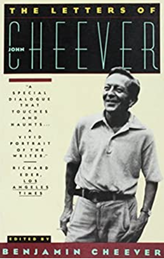A WRITER'S WIT |
My Book World

This collection of letters from the 1930s to 1982 is as much about the editor, John Cheever’s eldest son, as it is about the senior writer. So many times in reading a compendium of letters, one is left alone to solve certain puzzles the letters may contain. For most letters Benjamin Cheever glosses events, dates, but most important, personalities, and by doing so he allows readers a deeper view into his father’s letters, his father’s life, the life of their family: John Cheever’s wife, Mary; daughter Susan, Benjamin, and a second son Fred (born Federico in Italy).
Having read Cheever’s journals some years ago, I again encountered his wicked wit, in which he slices humanity a new asshole but also a humane man who loves that very flawed humanity and is kind enough to portray his characters that way. For the wicked sense of humor: “About a month ago Mary took a job teaching English at Sarah Lawrence two days a week and so she journeys out to Bronxville on Tuesday and Fridays and comes home with a briefcase full of themes written by young ladies named Nooky and Pussy” (124).
Or this, with a scintilla of rage: “I got back to work on the book about a month ago, but was dealt some crushing financial blows three weeks later and now I’m back in the short story business. I want to write short stories like I want to fuck a chicken” (125).
And a sweet cat story: “The cat, after your leaving him, seemed not certain of his character or his place and we changed his name to Delmore which immediately made him more vivid. The first sign of his vividness came when he dumped a load in a Kleenex box while I was suffering from a cold. During a paroxysm of sneezing I grabbed for some kleenex [sic]. I shall not overlook my own failures in this tale but when I got the cat shit off my face and the ceiling I took Delmore to the kitchen door and drop-kicked him into the clothesyard” (235).
But ultimately, as I said, Cheever loves humanity and declares as much by way of a Time magazine interview chronicling his career: “My sense of literature is a sense of giving not diminishment. I know almost no pleasure greater than having a piece of fiction draw together disparate incidents so that they relate to one another and confirm that feeling that life itself is a creative process, that one thing is put purposefully upon another, that what is lost in one encounter is replenished in the next, and the we possess some power to make sense of what takes place” (240).
Now for the sex part of this profile: Editor Ben, eldest son to Cheever, discovers that his father is not bisexually bicurious in a furtive, shameful sort of way but has had sexual-emotional relationships with many different men over his lifetime. Cheever’s letters attest to having done the deed with (grad student of Cheever’s) Allan Gurganus (about his son’s age) and photographer Walker Evans about whom he tells this story: “When I was twenty-one Walker Evans invited me to spend the night at his apartment. I said yes. I dropped my clothes (Brooks). He hung his (also Brooks) neatly in a closet. When I asked him how to do it he seemed rather put off. He had an enormous cock that showed only the most fleeting signs of life. I was ravening. I came all over the sheets, the Le Corbusier chair, the Matisse Lithograph and hit him under the chin. I gave up at around three, dressed and spent the rest of the night on a park bench near the river” (304).
I must say that I admire John Cheever’s zest for life, an enthusiasm he did not relinquish until the day he died. And even then?
NEXT FRIDAY: My Book World | Charlotte Brontë's Jane Eyre



 RSS Feed
RSS Feed